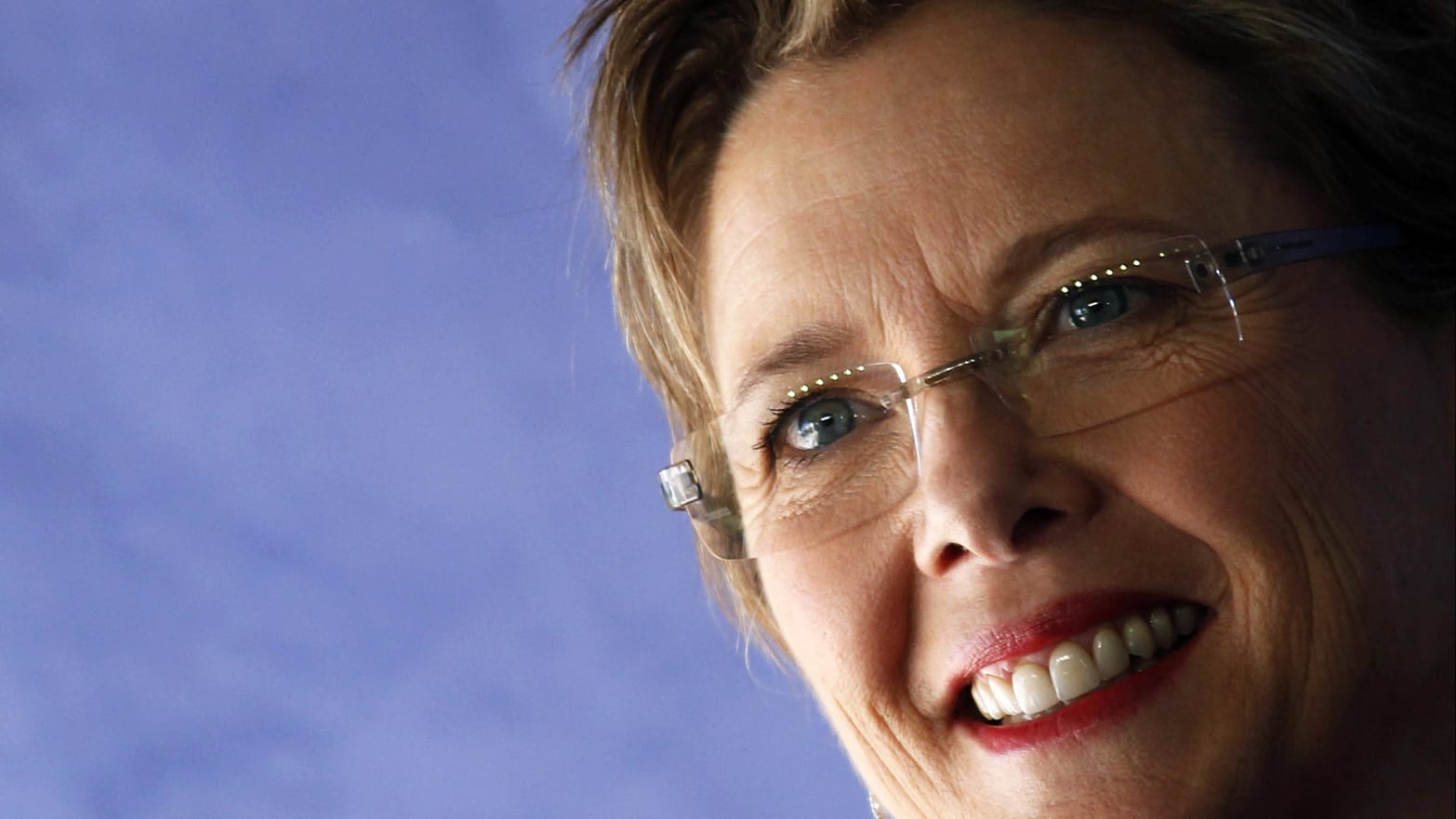While Annette Bening and I are talking in a Manhattan hotel room a few weeks after the election, I mention to her how the internet’s minions are dream-casting her as Hillary Clinton in a biopic.
She immediately sets her tea down, her eyebrows lifting in surprise and her whole body kind of just… sparking, the way Annette Bening seems to ignite when she gets excited—that crackling energy we love watching onscreen. This time, it’s happening in real life.
“I haven’t heard that! Wow,” she exclaims, the timbre of her voice mellowing into that familiar purr that has become so, well, Annette Bening. “What a story that will be.” A Hillary Clinton biopic? Her head nods the punctuation after each syllable: “What. A. Story. Wow.”
We’re meeting to talk about her role in 20th Century Women, another masterful performance from the four-time Oscar-nominated actress. Bening’s utter Bening-ness is more in focus than ever because of the way the film utilizes the star’s uniqueness and energy better than we’ve seen yet.
Her Dorothea in 20th Century Women is a single mother in Carter-era California fretting about the proper way to raise her son into a suitable man.
That the essence of Dorothea is hard to nail down is partly because of how authentically complex she is. Part of it, too, is because of how familiar she is. She’s the woman we all know, played by an actress who has, over the years, turned juggling attributes such as wise, quizzical, strong, brittle, assured, and anxious into an art form. An art form that’s never been on more masterful display than it is here.
A careful, lovingly constructed portrait of three women of three different ages with unique, cliché-less experiences dictated by a very specific time, the film, written and directed by Mike Mills, isn’t just a middle finger to an industry resistant to complex, realistic portrayals of female characters. It’s a call to arms to a country that needs to be reminded how important women like the ones the film depicts are going to be over the next four years.
There are so many great lines, little jewels of wisdom, delivered from the female ensemble of 20th Century Women to the teenage boy they are helping shape into a man. One of the greatest comes from Greta Gerwig’s Abbie: “Whatever you imagine your life is going to be like, know your life is not going to be anything like it.”
It’s the kind of froofy, beat advice you might expect from a feminist artist living at a boarding house in 1979 Santa Barbara.
But the ways in which the line resonates—to the film’s young boy, to the writer-director the boy is based on, to people who lived through that time, people fascinated with that time, and, especially, the film’s star Annette Bening—reach far beyond the pitch-perfect time capsule that 20th Century Women has created.
As Bening recounts both the uncanny similarities and the wild differences between her own life and that of the teenage boy her character mothers in the film, she marvels at how simple the film’s importance to her is: “I had never read a story about the time and place I was from.”
There are biographical parallels, like that she was 21 in 1979 when the movie takes place, making her only a few years older than the teenage boy in the film. She was living in San Diego, a little south of the film’s Santa Barbara setting, but on the California coast nonetheless.
And hitting theaters in the wake of a dramatic election and explosive cultural discourse, the film’s dual portrait of the women in a generation formed by that highly sociopolitical time—women like, say, Hillary Clinton—and its questioning of what it means to be a man packs an urgent punch.
Mills, who previously gave the semi-biographical treatment to his father in the 2010 film Beginners, intended the film to be a love letter to his mother and has called 20th Century Women “an ode to the women who raised me.” For Bening, who plays Dorothea, the dramatized version of Mills’s mother, the story has the same power.
“Dorothea to me is so interesting because she’s very much a woman of her time,” she says. “It’s my parents’ generation and [she] has many of the qualities one associates [with the time]. But in many ways she doesn’t do what you expect her to do. She’s more of an iconoclast. She sort of goes against the grain and sometimes doesn’t do what’s expected of her in a way that I really love.”
How do we describe Dorothea?
Bening uses the word “bohemian” at one point, but doesn’t quite think that’s right. She has an avant garde way of parenting, enlisting two boarders in her house—Gerwig’s punk photographer Abbie and Billy Crudup’s hippy handyman—to help raise her 14-year-old son, Jamie (played by newcomer Lucas Jade Zumann), along with Jamie’s precocious, sexually assured best friend Julie (Elle Fanning).
Her strategy is born out of anxiety to do right by her son—without a father figure, maybe these split portraits of women could teach him how to be a man—and a heartbreaking awareness that, as his mother, she can’t always be around for him. “You get to see him out in the world as a person,” Dorothea tells Abbie. “I never will.”
Dorothea was born just before the Great Depression, and chain-smokes her way through the plain-spoken practicalities and traditionalism of a woman of that time: “I just think that having your heart broken is a tremendous way to learn about the world,” Dorothea tells Jamie. But she’s also a woman who embraced the freeness of the ’60s.
“To me Dorothea was very much Annette, in body and timing and soul,” Mills has said. “It was fun to sort of show her my mom, always saying to her to take what’s interesting and dump the rest.”
But to Bening, Dorothea was an enigma. “It wasn’t like I immediately gravitated to her and thought, like everyone else, apparently, ‘That’s me!’” Bening says.
What she experienced was, in a way, more personal. In 1979, she was at an age somewhere in between where Julie and Abbie are in the film. She had moved to San Francisco to go to acting school. “I was more thinking, ‘Oh my god, this is my world. I know that guy. That was my boyfriend,” she says, referring to Crudup’s William.
Reading the script and playing Dorothea re-contextualized that time for her.
“I had an interesting life there, although my life wasn’t like a bohemian or whatever you want to call this world I’m in, and my parents weren’t like Dorothea,” she says. “But yeah the whole time and smell, the ocean and sand and all that world I grew up in. The water. And also the boredom and the California world, the people, all felt familiar in a way that was refreshing to me.”
Bening’s parents are still alive. They’re 90 and 87, she proudly says, and have been married 66 years. She grew up the youngest of four children, two born in Iowa and two born in Kansas. They were a family of Republican Episcopalians from the Midwest who transplanted to the West Coast when she was 10. Her parents still live in San Diego, in the same house. When she visits, Bening still sleeps in her childhood bedroom.
“My world was really different,” Bening says, comparing her formative years to that of Jamie’s. But that’s the quiet magic of the film. Dorothea is trying to coax her son toward manhood at a time when, as she narrates, there’s a meaningless war, protests, a nation reeling from political scandal, and a culture increasingly influenced by computers, drugs, and boredom.
In its unflinching nostalgia, 20th Century Women transforms the sappy wistfulness we usually associate with such sentimentality into a visceral resonance, not just because you recognize the women you’re seeing onscreen but also because it opens your eyes to how that time shaped the women they have become today.
To that regard, it’s near impossible to divorce a viewing of the film from the sociopolitical climate in which it is being released, a time when the first female presidential candidate, a woman who is around the same age Dorothea would be, lost her bid, drowned in a flood of misogynistic discourse and stifled opportunity.
“For me, everything I’m seeing now has an urgency,” Bening says, referring to 20th Century Women’s timeliness. “Like, ‘Oh.’
“We’re also talking in the film about Jimmy Carter and that famous speech he made,” she says. (A pivotal moment in the film is soundtracked by Carter delivering his “Crisis of Confidence” speech.)
“To have that moment when a president who was a peanut farmer, compared to our soon-to-be president, who was arguing against materialism and talking about the collective and talking about taking care of our own and talking about energy and energy issues,” she says. “I definitely see that in a different context. Not just our film, but every film.”
She mentions the way Moonlight tackles homophobia, poverty, and xenophobia. She mentions artists and journalists, and anyone who feels a bigger responsibility. She straightens herself on the couch, puts down the tea she’s been sipping, and leans in closely.
“As moviemakers, we have a responsibility to reflect back our culture, you know, what’s going on in our hearts,” she says. “Because that’s the biggest thing we can do. So that for me has a significance I’m really proud of in the film, and I hope people will see it in that context.”
Her full body nearly goes into italics as she stresses the word urgency again. She’s already starting to feel it, too, among people making theatre, making movies, writing books, and journalists: “How can we use what we do to affect this new reality that we’re living in that I can say for myself I certainly never even imagined that this could be the reality we’re living in?”

